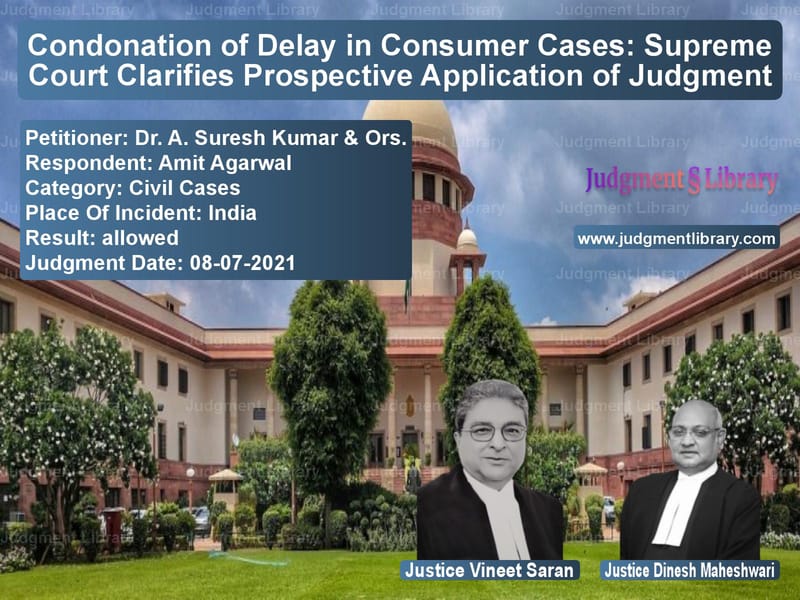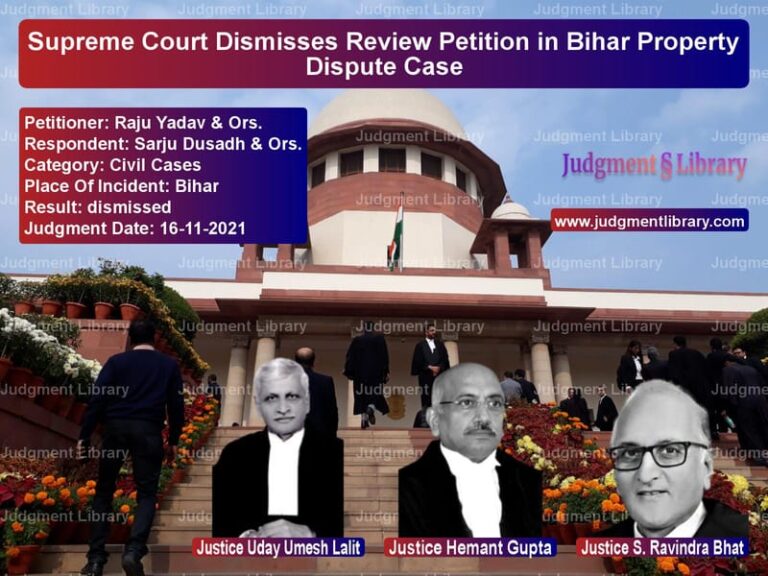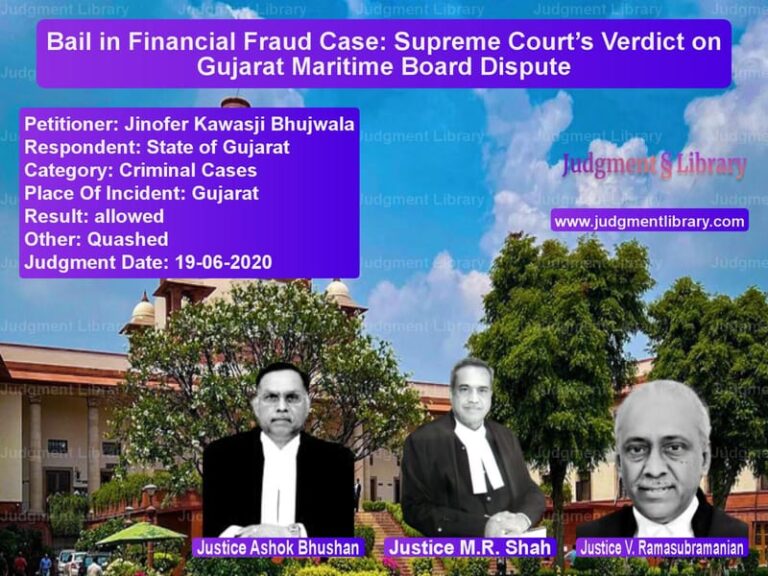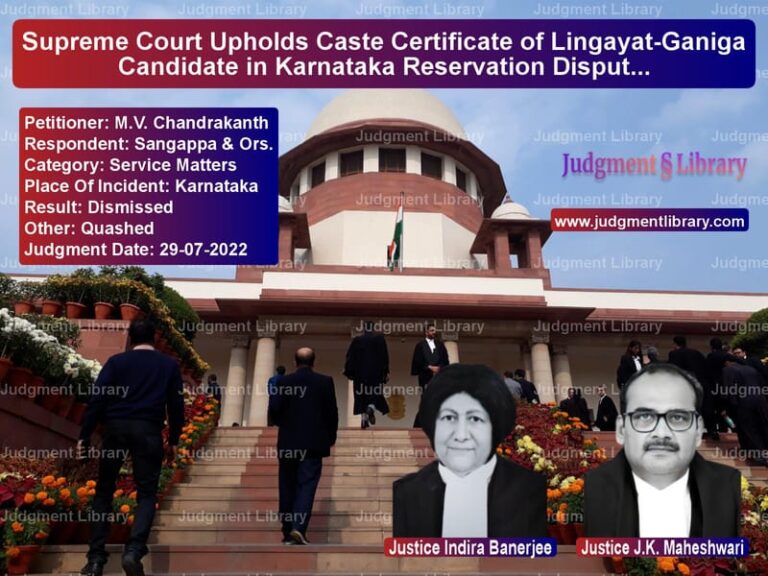Condonation of Delay in Consumer Cases: Supreme Court Clarifies Prospective Application of Judgment
The Supreme Court of India, in its judgment dated 8th July 2021, in the case of Dr. A. Suresh Kumar & Ors. v. Amit Agarwal, addressed the crucial issue of condonation of delay in filing written statements before the National Consumer Disputes Redressal Commission (NCDRC). The Court examined whether the ruling in New India Assurance Company Limited v. Hilli Multipurpose Cold Storage Private Limited, which set a strict 45-day limit for filing written statements, should apply retrospectively or prospectively. The judgment was delivered by Vineet Saran and Dinesh Maheshwari.
The Supreme Court ruled that since the Constitution Bench’s decision in the Hilli Multipurpose Cold Storage case was intended to apply prospectively, the NCDRC should have considered the delay application on its merits instead of dismissing it outright. The Court condoned the delay of seven days in filing the reply, subject to a penalty.
Background of the Case
The respondent, Amit Agarwal, had filed a consumer complaint before the NCDRC alleging medical negligence against the appellants, Dr. A. Suresh Kumar & Others. The appellants were required to file their written statement within the statutory period of 30 days, extendable by another 15 days under the Consumer Protection Act.
The appellants submitted their written statement on 25th November 2019, seven days beyond the permissible 45-day limit. They also filed an application for condonation of delay, citing unavoidable circumstances. However, the NCDRC rejected the application, relying on the Constitution Bench ruling in New India Assurance Co. Ltd. v. Hilli Multipurpose Cold Storage Pvt. Ltd. (2020) 5 SCC 757, which held that delays beyond 45 days cannot be condoned.
Aggrieved by the NCDRC’s decision, the appellants approached the Supreme Court.
Legal Issues Before the Court
- Whether the New India Assurance judgment should apply retrospectively to cases where the delay occurred before the ruling.
- Whether the NCDRC was justified in rejecting the condonation application without assessing the merits of the delay.
- Whether the appellants’ seven-day delay in filing the written statement was excusable.
Arguments by the Appellants
The appellants, represented by Anand Shankar Jha, contended:
- The Constitution Bench in New India Assurance had categorically stated in paragraph 63 of its judgment that the ruling would operate prospectively.
- The delay of seven days was minimal and was supported by a valid explanation.
- The rejection of the condonation application violated principles of natural justice, as the NCDRC did not even assess the merits of their reasons for delay.
Arguments by the Respondent
The respondent, Amit Agarwal, represented by Amalpushp Shroti, argued:
- The law laid down in New India Assurance was clear that delays beyond 45 days were not condonable under the Consumer Protection Act.
- Strict timelines in consumer cases were essential to ensure speedy justice to aggrieved consumers.
- The appellants had been negligent in filing their reply within the stipulated period, and condoning the delay would set a bad precedent.
Supreme Court’s Observations
The Supreme Court ruled in favor of the appellants and made the following key observations:
- The Constitution Bench in New India Assurance had explicitly stated that the ruling would apply prospectively.
- Since the appellants had filed their written statement and delay application before the 4th March 2020 judgment in New India Assurance, the NCDRC should have considered the application on its merits.
- In cases where delay occurs before a new precedent-setting ruling, the principles of justice require that parties be allowed an opportunity to present their justification.
- The delay of seven days was minor, and the appellants had provided a valid explanation.
Final Verdict
The Supreme Court set aside the NCDRC’s order and ruled:
- The delay of seven days in filing the written statement was condoned.
- The condonation was subject to the appellants paying a cost of Rs. 25,000 to the respondent within 15 days.
- Failure to pay the cost within the stipulated period would result in the rejection of the written statement.
- The NCDRC was directed to proceed with the consumer complaint expeditiously and preferably dispose of it within six months.
Impact of the Judgment
The ruling has significant implications for consumer litigation and procedural fairness:
- Clarifies Prospective Application of Judgments: Courts must ensure that new precedents do not unfairly impact pending cases where parties acted under a different legal framework.
- Upholds Natural Justice: The judgment reinforces that procedural rules should not be applied rigidly if doing so leads to injustice.
- Balances Timeliness and Fairness: While consumer cases require speedy resolution, minor delays with valid reasons should be considered with discretion.
- Guidance for Lower Courts: Tribunals and commissions must assess delay applications on their merits rather than summarily dismissing them based on later rulings.
Conclusion
The Supreme Court’s decision in Dr. A. Suresh Kumar & Ors. v. Amit Agarwal ensures a fair balance between procedural efficiency and justice. While it acknowledges the importance of timely proceedings in consumer cases, it also recognizes that technical rigidity should not override fundamental fairness.
The ruling provides crucial guidance for future cases, reaffirming that judicial precedents with strict procedural implications should be applied prospectively to avoid undue hardship. The decision serves as an important precedent for courts, tribunals, and litigants navigating procedural deadlines in consumer and civil litigation.
Petitioner Name: Dr. A. Suresh Kumar & Ors..Respondent Name: Amit Agarwal.Judgment By: Justice Vineet Saran, Justice Dinesh Maheshwari.Place Of Incident: India.Judgment Date: 08-07-2021.
Don’t miss out on the full details! Download the complete judgment in PDF format below and gain valuable insights instantly!
Download Judgment: dr.-a.-suresh-kumar-vs-amit-agarwal-supreme-court-of-india-judgment-dated-08-07-2021.pdf
Directly Download Judgment: Directly download this Judgment
See all petitions in Consumer Rights
See all petitions in Legal Malpractice
See all petitions in Damages and Compensation
See all petitions in Judgment by Vineet Saran
See all petitions in Judgment by Dinesh Maheshwari
See all petitions in allowed
See all petitions in supreme court of India judgments July 2021
See all petitions in 2021 judgments
See all posts in Civil Cases Category
See all allowed petitions in Civil Cases Category
See all Dismissed petitions in Civil Cases Category
See all partially allowed petitions in Civil Cases Category







